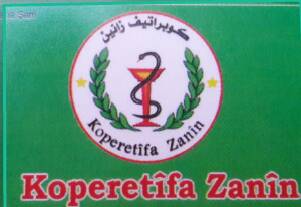A co-operative operates on the principles of self administration and participation, preserving mother nature and working on the basis of creating a democratic and ethical society. The co-operative societies are economic centres for the service of the community which also attempt to improve living conditions. Their mission is to curb monopoly and individualist capitalism. The co-operative societies co-ordinate work between them, exchange skills and support each other in every way in order to develop production in a communal society, where participation increases, unemployment is reduced, and living standards improve.
Through co-operatives, society develops economic activities and a communal culture. The co-operatives base their work and management on the principles of the democratisation of the communal economy, and every society works on building the mechanisms of their management democratically and directly monitors the members of the co-ops, dedicating a percentage of their income to the poor.

Zanîn Co-operative’s total shares are worth five hundred million SYP [Syrian Pounds]
Because of the increase in the demand for medicines and the absence of some important ones in Rojava, a decision was made to start a co-operative project to satisfy Jazira Canton‘s [Kantona Cizîrê / Cezîre] need for medicine.
Samir Sadeq Aany, co-chair of the Chamber of Industry and Director of the Construction of Co-operatives, said: ”Zanîn is a co-operative for medical, dental and pharmaceutical supplies and equipment for hospitals and clinics. The idea for this project came from a group of doctors who work in Jazira. Zanîn is a communal co-operative, and the price of a share is 100,000 SYP. There are a total of 5,000 shares which are collectively worth five hundred million Syrian pounds. Registration will be through the people’s houses [Mala Gel] in all neighbourhoods. Every member can participate with up to 8-10 shares, but not more. 75-80% of the members are doctors and pharmacists, and that will make the co-op more successful, because the objective of Zanîn is not only profit, but also to make medicines available, reduce their prices ─ which tend to be fluctuating in pharmacies, destroy monopoly and allow people to access medicine at affordable prices.”
The people who work on this project are specialists and have a lot of experience
The board of directors is composed of twenty members who are elected democratically. The financial committee is composed of three members who are accountants and have experience in trade and economy. The administration is composed of five members, three of whom are the founders of this co-operative. The monitoring committee is composed of five members, and their job is to monitor the line of work; the sale prices of medicines. The profits are announced every six months. Zanîn Co-operative for Medicines is in Eyalah Qamishlo, east of the big municipality, beside the big bridge.
The opening of a central pharmacy in Qamishlo that works for twenty-four hours a day
A central pharmacy that is open twenty-four hours a day for prescription medicines will open in the centre of the city of Qamishlo on the Al-Wahdeh high street. Six specialists are going to distribute the medicines, three of whom will begin distribution from the eastern part of Qamishlo to Dêrik, and the other three of whom will distribute from the western side to Serekaniye . Two vans have been dedicated for the distribution outside of Eyalah Qamishlo. The medicines will be imported from Bashur [South Kurdistan / North Iraq] and Bakur [North Kurdistan / East Turkey], and also from Homs, because the factories and pharmaceutical companies are there, and contracts will be signed with them.
A big project is being studied, and it is the first of its kind
Samir Sadeq said, “A big project will start in the near future, and that is the construction of a medicine factory in the city of Qamishlo, which is being studied at the present time. We have specialists in this field who have good experience, and they will co-operate in this project. We are in times of revolution, and we need a lot of first aid materials that will be manufactured in the medicine factory in Qamishlo to make supplies for the moving clinics, hospitals and frontline medics.”

